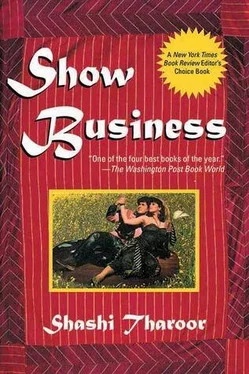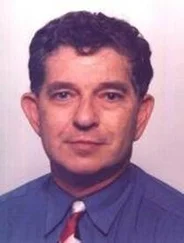Yet more vignettes: Brahmins are abused and beaten by muscular men in chariots, their womenfolk used without fear of consequence. In one scene a laughing officer of the court rips the clothes off a protesting woman and takes her by force. [“Wonly mythological story with rape scene,” said the happy producer to the superstar. “But yit is all in the Puranas. Guruji was confirming.”] Moral collapse falls both ways. Slatterns seduce strangers in temples before the shocked but unblinking gaze of the deities. Servants become masters and claim their former mistresses; men of nobility and breeding are forced into the streets. The social order has broken down; the world is in chaos.
The land is scorched dry in dismay. Cracks and fissures open up in the earth; not a blade of grass grows. Plants and flowers wither into ashes, leafless trees raise skeletal branches in surrender. In the barren fields men and women begin to drop dead, their knees buckling in exhaustion. Seven suns appear in the scorching sky, each burning with the fury of heavenly rage. Their rays shoot down to earth like lasers, sucking the world drier still: wells crumble into dust, rivers are drunk up by the insatiable rays, the seas churn skyward and evaporate. Into this desolate land, in a little hut in the midst of a dying forest, a little boy is born to a Brahmin hermit and his dutiful wife. A boy who emerges in the shape of a well-known child artiste, with a halo shining round his head.
“The Lord has blessed your womb,” the saffron-clad hermit says to his wife, as he prostrates himself before his own son. “Vishnu has come to us.” And as she does likewise, throwing herself at the child’s pudgy feet, the boy is transformed by a cinematographic miracle into Ashok Banjara, clad in resplendent white, a bow in his hand and a quiver of divine arrows on his bare shoulder.
“Rise, Mother,” he says. “You have given me birth; you shall not bow before me.” He lifts her to her feet and turns to offer a respectful namaskar to the hermit, who takes the dust of the superstar’s feet onto his forehead before rising, his long white locks now lustrous with divine benediction.
“The world is no longer a fit place for the likes of you,” Ashok says sadly. “The natural order of the universe has been turned on its head; injustice and depravity reign; dharma is in disarray. The time has come to end it all.”
The hermit nods. “Kaliyug has reached its nadir.”
“See,” says his wife, “I do not even have water with which to wash our Lord’s feet.”
“There is no need,” Ashok says, compassion battling smugness on his visage. “Your tears of joy as you bent to receive me have already bathed my feet.” His surrogate mother looks suitably gratified at this hyperbole.
“What will you do, my Lord?” the hermit asks.
“What is necessary.” Ashok looks around him. “For everywhere I see that dharma has been violated and mocked. Betake yourselves to pray for the next world, because this one is coming to an end.” And even as he speaks the skies appear aflame. Gigantic clouds, garlanded with fire, appear between the suns; thunder roars. “A mighty conflagration is building up,” Ashok says, “which shall reach from the bowels of hell to the thrones of the gods. And then the rains shall come, a mighty crushing flow that will dissolve what the fire has burned, till the dry riverbeds become surging torrents, and the seas swell up to invade the sandy coasts; then mountains shall tremble and crumble into the dust, and the earth sink under the cleansing flood. For twelve years this rain shall last, and through it all, I shall dance the dance of destruction, till no one of this cursed earth remains upon it. When it is all over, the fire spent, the waters calmed, then, once again, will peace and dharma return to the world. But for now, my blessed parents, you who have been chosen to bring me, as a son of Brahmins, upon this earth to fulfill my divine mission — I must bid you farewell.”
Ashok raises folded palms to them, the halo shining ever brighter around his head. He raises one hand, and instantly a white stallion appears by his side; his robes are transformed into the short battle dress of a warrior horseman; and in his right hand has sprung a brilliant sword, its sharp edges aflame with sulfur and righteousness.
“Kalki,” his parents breathe.
And then he is off, fiery weapon in hand, to show the forces of evil that he has come to put out their faithlessness with a great conflagration.
[This is how it happened.
[The crowds outside the studio were enormous; inside, the massed ranks of actors, extras, technicians, production executives, delivery boys, hangers-on pressed around the equipment for the shooting of the great horseback sequence. People were milling about; somebody shouted “close the doors,” and somebody did .
[Proud of his record of not having employed a double for most of his stunts (“They’d never find one who could really look like me,” he used to say), Ashok, flaming sword in hand, began his canter on the white stallion. For a moment it was as glorious as it was meant to be, the resplendent figure of righteousness charging onward to bring retribution to a faithless world. Then a flame seemed to spurt from the sword, singeing the horse, which bolted out of its rider’s control. The rest was a blur. The stallion ran wild, through the studio set, into the technicians and their equipment. Amid the screams Ashok Banjara fell, thrown by his mount; his sword fell with him, plunging into some carelessly strewn cloth, which promptly ignited; and with a whoosh the flames leaped to the ceiling .
[ Tongues of flame licked scripts, sets, and sidekicks. Accompanying the screams of panic, cast and crew and hangers-on ran everywhere they could; someone got to the door but found it shut, the tumblers of the lock having fused in the heat. The blaze voraciously devoured wood, canvas, drapes, metal, and human flesh. Smoke choked the lungs of those who were screaming for help, acridly scarring the throats of dialogists, sapping the sinews of stuntmen, obscuring the eyes of actresses.
[ When it was all over, the destruction was complete. The smoldering remnants of the set turned up twenty-seven bodies, including that of the producer, Murthy. Another twenty-three were admitted to the hospital, where four died in intensive care and one, an actress who had been burned beyond recognition, committed suicide with her mother’s help .
[ Ashok Banjara had contusions, concussions, broken bones, and burns. But he survived. ]
MonoiogLies: Night / Bay
PRANAY
So they tell me it doesn’t look too good. Vital signs in decline, the doctor said. I can’t say I’ll grieve for you, Ashok Banjara. In fact, your departure should make a lot of things easier. But still, I don’t really want you to go.
Now that’s a lot, coming from me. You’ve never liked me, but I’ve hated you. Right from the moment you took Maya away — but much more in the years since, for all you’ve done to her. When I came to the hospital first, befriended your parents, talked to your brother, it was all for Maya’s sake. To establish myself here where I could do her some good. But after all these weeks, Ashok, and I admit this grudgingly, I’ve developed a bit of an interest in you and your welfare. Especially after the doctor initiated these talking sessions, and I found myself the only one who was willing to volunteer for the first one. There’s a strange sort of bond that’s sprung up in the process. I don’t suppose you feel it. I don’t suppose you feel anything, for that matter. Not that feelings were exactly your strongest suit before the accident either, hanh?
Читать дальше












